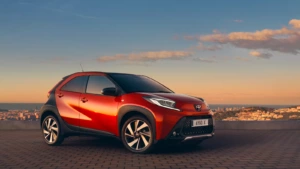News
SUVs replace microcars as the top choice for car buyers
This article is more than 3 years old.
SUVs account for 57.5 percent of all car sales in Denmark at the moment … up 16 percent compared to last year

The Toyota Aygo X model is the best-selling SUV (photo:toyota.dk)
From 2009-2019 the most popular car model sold in Denmark was the Volkswagen Up microcar. It was even named Car of the Year in 2013.
But car owners in Denmark are going bigger now.
Whether it be the car factories slashing production of small cars or people needing more space in their vehicles to pursue outdoor activities following the COVID-19 pandemic, microcars are no longer top dogs.
According to motormagasinet.dk, the SUV which has risen to the top, accounting for 57.5 percent of car sales in Denmark at the moment – up 16 percent compared to last year.
READ ALSO: Europe’s greenest country no good for electric car owners, claims study
Safer driving experience
Meanwhile, microcar sales plummeted to just 2.4 percent this July from about 10 percent in July last year.
Last year, the best-selling car was the Ford Kuga SUV and this July the Toyota Aygo X model was the best-selling SUV with 5,660 cars sold.
A funny side note is that the Toyota Aygo X is actually the smallest of the SUVs and was developed from the Toyota Aygo … which was a microcar.
“SUVs are cars that I personally think have a higher centre of gravity and are not as easy to drive. But they are popular and people feel safer in them because they are taller,” Allan Bauer a journalist for Motormagasinet, told TV2 News.










































